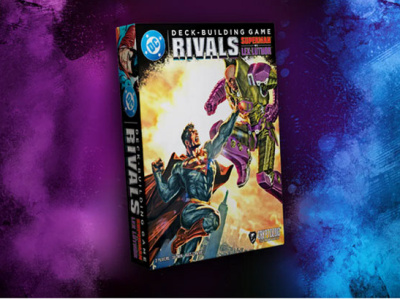View from the Game Store is a new bi-weekly column by Marcus King, Director of Retail Operations at Troll and Toad in London, Kentucky. This week, King shares his experience running a store with gaming space, and the math.
I opened my first game store in 1986 in Anchorage, Alaska. It was in the Muldoon Mall, for those of you in Anchorage. My competitors were Bosco's and Spenard Hobby. The Muldoon Mall was dead. I mean, the kind of dead that you don't even see in a lot of small town malls these days, where occupancy is hovering around 60%. The Muldooon Mall had no anchor stores, it had a bowling alley, a coin shop, and that was nearly it. Most of the store spaces weren't even finished, had never been occupied. They were concrete shells.
The one advantage I had with my location was play space. The mall management didn't mind a bit if I set up tables in the hallway or empty storefronts to play in. We could have as many tables full of players as we wanted to drag out and set up. Meanwhile, Spenard's was an old school hobby store with 300% more inventory than they could display. They had rock tumblers and candle making kits, kites and puzzles, science kits and model rockets. But no play space. Bosco's was much cleaner, and well organized, but they had no tables in their store. So, my play space was my only advantage. We played Battletech, Warhammer, Dungeons & Dragons, Twilight: 2000, Traveler: 2300 and Mega Traveler. We played Friday night, all day Saturday and Sunday. The place was packed, with 10-20 tables every weekend.
I sold that store in 1990, the new owners quickly moved it to the University Mall, and they were out of business in less than a year. They gave away their only advantage. I suppose it didn't help that they increased their rent by 600% either (some people don't do the math).
Today I find that most stores have organized play of some sort, yeah? Not all, certainly, but most. Magic: The Gathering and then Pokemon changed that. Mage Knight, HeroClix, Yu-Gi-Oh!. Other games. Board game nights, RPG Groups, chess clubs, and other activities.
I find it ironic that while many customers want to play in the store, some still want that store to price match Amazon. Again, some people don't do the math.
Business Lesson: Just stop reading here if you don't want to hear yet another retailer tell you why it is important to support your local game store. I know most customers either already support their local store, or have decided they don't need to. This is not aimed at you, bro-man (or woman). This is aimed at the would-be retailers, the next crop of enterprising young entrepreneurs who want to open game stores because they love the hobby, and want to help others enjoy those hobbies. To those entrepreneurs I say, don't. Do not. Don't do it. Invest your money in anything else. Opening a game store because you want to help others enjoy the hobby you love will do two things: diminish your love for the hobby, and cause financial hardship on you.
If you want to open a game store, do it because you want to make money. It (probably) won't make you rich, but you can both enjoy your work, and make a good living, but you have to do the math.
A store pays rent. In every instance I am aware of, the store pays rent on all their space. By the square foot. If you take 25% of your space and devote that to gaming space, this forces your rent on the other 75% to artificially increase. Let’s say you have 4000 square feet of usable space. You pay $1 per square foot a month. $4000. You devote 1000 to gaming space. So, you have 3000 square feet of space to make sales with--to devote to products and display. But, you are still paying rent on all 4000 square feet. So, your "sales display" area now has to pay the rent on the other space that is not generating sales. The space you actually use for sales must support the non-sales generating area--so that space now costs 33% more per square foot.
The internet, Amazon, eBay, other sites, they don't do this. They don't pay rent on play space.
Those sites also don't pay "retail" rent rates. Warehouse space generally costs far less per square foot than retail space in a prime location does.
Supplying the space for people to game is important to many retail stores, it is what sets them apart from Amazon, online, Walmart, Toys R Us, and other venues you can buy games from. And, you must leverage that space. If you cannot leverage it to generate, garner, and capture more sales at retail--you likely won't survive.
Here is how we do it, and I am not saying this is the only way, certainly not. I am sharing how it works for us, so prospective retailers or struggling retailers, can perhaps find a better way for themselves.
We have RPG events where people buy a $5 gift coin to gain entrance into the gaming area. That $5 coin can later be spent in the store to buy anything in the store, except another gift coin. That $5 gift coin can buy snacks, be saved up to buy a big expensive RPG book, or be combined with a little cash to buy a dice set. But, on RPG night when we seat 30 people to play RPGs, that generates $150 in cash for the store. It is, therefore, worth our time, and my staff's paid efforts, to schedule DM's and run things.
We have Magic, Pokemon and Yu-Gi-Oh! events that generate a profit. We are not paying customers to come play in the store; we move product profitably, or run an event that generates a profit. This pays for a staff judge to be present and run things.
In our regular retail space we review each category each month, and eliminate the worst categories of merchandise, while expanding and growing the better categories. We add new merchandise lines, refocus our efforts to support those growing in popularity, and we put slow-moving merchandise on clearance. About 20% of our merchandise is considered "evergreen" (things we keep in stock and always replace when it sells). The rest is only replaced if it sells within 60 days of coming into the store, so we naturally have new items replacing older stuff all the time. Things that take more than four months to sell get discounted every 60 days thereafter, or are sold on either eBay or Amazon. We turn a profit. On every transaction if at all possible. Items that go on discount for 20% off are compared to what they might sell for on Amazon and eBay--if we can get more online, we do. When they age to 30% off, they are checked again. We want to turn our inventory, and make a profit, and offer the best possible shopping experience, customer service and selection possible.
The profits from those events and retail practices pay for our gaming outreach. We do game nights at local businesses and sponsor school events, attend community gatherings and festivals, all to expose more gamers and hobbyists to our store, and our hobby. When local Church Groups, Scouting Groups or other Youth or local charity groups approach us for donations, we can afford to give them games, gift coins or other merchandise.
Profits are what allow us to pay eight staff, instead of just my wife and me. My full time staff get dental, vision, health insurance. Paid vacation. Those are the kind of benefits you can offer to staff when you are profitable.
Having been at this for 29 years, I can say that I have ran both huge stores (6500 square feet) and small stores (220 square feet). I have run one-man stores, and shops with 12 on staff. And, it took me a long time to understand the math. Once I understood the difference between running a "club" and running a business, it became more profitable, and the profits afford the customer a much better place to buy, play and enjoy their hobbies.
However, if the gaming area became unprofitable, I would do as I did in 2002, when I literally gave away all my gaming tables and chairs, ran without a gaming area for three years, and built an online sales venue that was, itself, profitable.
Owning a game store is not a hobby, it is a vocation. It pays for my food, my home, and that of my staff as well. Profits are not optional. But, the gaming space is.
I am pleased that my store in Kentucky has the support of local gamers and hobbyists to afford us the 64-seat gaming area we have. But, if trends change, so will the store.
And, that is what it takes to run a successful game store: A dedication to be successful, profitable, sustainable.
And math. Lots of math.
If you have suggestions or requests for topics for future columns, please friend me on Facebook, and PM me your requests, comments, ideas, complaints or airing of grievances.
The opinions expressed in this column are solely those of the writer, and do not necessarily reflect the views of the editorial staff of ICv2.com.

Column by Marcus King
Posted by ICv2 on May 28, 2015 @ 2:16 am CT
MORE GAMES
'Rivals: Superman vs. Lex Luthor'
July 14, 2025
Cryptozoic Entertainment will release Rivals: Superman vs. Lex Luthor, a new standalone game for DC Deck-Building Game.
'Bomb Busters' Takes the Top Prize
July 14, 2025
The Spiel des Jahres jury has announced the winners of their 2025 board game awards.
MORE COLUMNS
Column by Scott Thorne
July 14, 2025
This week, columnist Scott Thorne discusses Green Ronin Publishing's GoFundMe to fund its legal fight against Diamond Comic Distributors, and the soft preorders for the latest Horus Heresy box.
Column by Scott Thorne
July 7, 2025
This week, columnist Scott Thorne looks at the effect of Diamond Comic Distributors' bankruptcy on the games industry.








